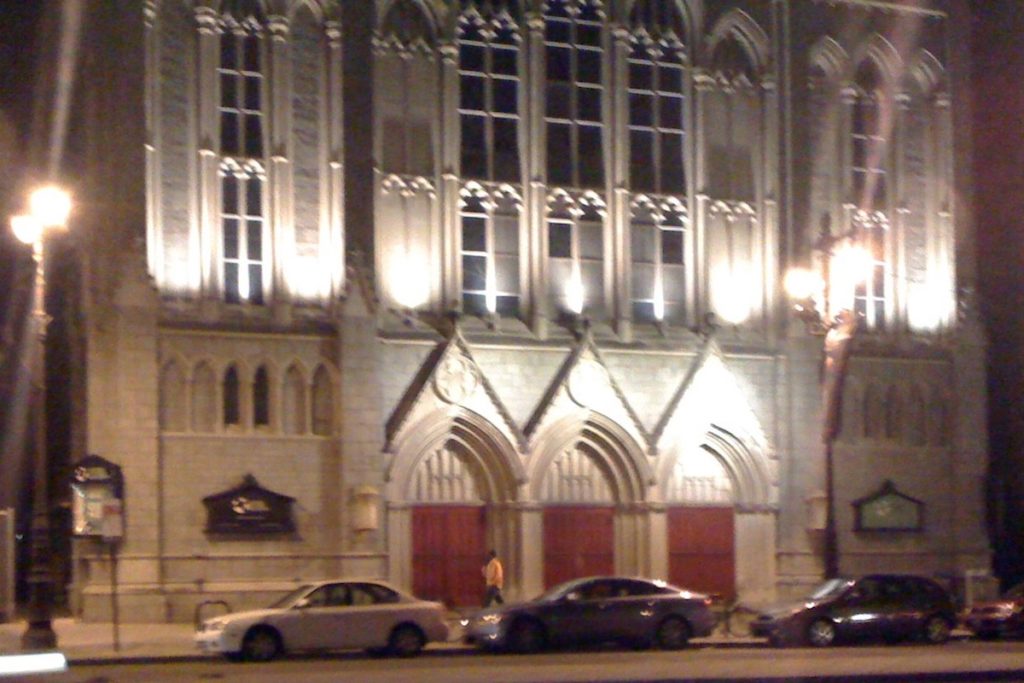In conversation with Bill Golderer: On changes at Philly’s United Way, his new hires and the bat signal
 April 15, 2019
Category: Featured, Long, Purpose
April 15, 2019
Category: Featured, Long, Purpose
Some 30 minutes into our conversation about the work of United Way of Greater Philadelphia and Southern New Jersey, Bill Golderer gets up, opens a drawer in one of the stands in his office, pulls out an image printed on heavy, glossy stock, and shows it to me.
It is Batman, back to the viewer, looking up over the painted city to the bat-signal, streaming clear and steady amid a swirling, starry Van Gogh night.
“When you see the bat-signal,” Golderer says, tapping the artwork, “it means there’s trouble in Gotham. That you are needed, and will you come?’”
“I am focused on getting that bat-signal in the air,” he tells me.
And while I don’t believe Golderer has cast himself as Batman in the analogy, there is something of the caped crusader in him when he talks about the significant changes he has instituted in his first year as CEO of the venerable nonprofit.
He is in the process of rounding out his new leadership team (there is one significant hire left to be made). Michael Banks, until recently the president of the African American Chamber of Commerce of PA, NJ and DE, will be starting as managing director of opportunity, entrepreneurship & employment May 6.
Banks is well-regarded (Philadelphia Tribune’s “Most influential 10 under 40”, the Philadelphia Business Journal’s “Most Talented Leaders 40 under 40”, and a recipient of the Philadelphia Sixers Game Changer Award) for his contributions to the economic empowerment and growth of African-American businesses in the region.
“Mike is a builder of value,” Golderer says.
Banks will join other recent hires: Jessica Paschke, the chief giving officer, who had been at United Way a scant week when Golderer and I meet; Jordan Schwartz (managing director, public affairs and regional prosperity) and Kate Houstoun (managing director, Impact U), who both started about two and a half months ago; and Nikia Owens, newly the managing director of financial empowerment, who has been at the organization for five years in a different role.
All of the new appointments come after major cuts in October of last year, when 37 people (nearly a third of the 100-person staff) in Philly were laid off. It was part of the effort to redefine the mission to concentrate on measurable poverty interventions — particularly those centered on early learning, employment opportunity and economic empowerment.
"If an organization like this says we are going to address this scourge, then everything and everyone needs to be deeply aligned."
“Prior to my arrival the [local] board of directors refined and narrowed the mission to reflect the need for critical engagement with poverty,” Golderer says. “We could no longer be everything to everyone. The choice was to say ‘poverty is our issue’ and then to ask ‘are we built to address that?’ If [we are mainly] processing people’s gifts and helping them with their payroll deductions … then that’s not what we’re saying we’re going to do. If an organization like this says we are going to address this scourge, then everything and everyone needs to be deeply aligned.”
“Some people are going to be disaffected and angry at the change — that comes with it,” he adds.
Golderer, in addition to being CEO, is an ordained Presbyterian minister and the senior pastor of Arch Street Presbyterian Church, so he talks a little about the human costs of the layoffs, and his regret seems genuine and heartfelt. But he doesn’t linger on it, and is soon back to enthusiastically describing his chosen team — who he refers to as astronauts — and the new mission.
Houston, we have a problem
Spend any amount of time with Golderer and his astronauts and you’ll eventually hear the phrase “Catch Houston.” And, no, despite the fact that the space program’s mission control is located in Houston, the phrase isn’t part of the astronaut analogy.
It refers to Philadelphia’s poverty rate — 26% — and Houston’s — 20% — and the six-point reduction Golderer aims to effect.
Owens — who Golderer calls “the people’s champion” — is excited by the challenge this presents.
“In my service to the work at United Way, I am fortunate to work with some of the highest-performing nonprofits in the sector that are empowering people to build stronger financial foundations and futures for themselves and their families through proven asset and skills development strategies,” she tells me via email, about a week after my conversation with Golderer has taken place.
"Our renewed focus on strengthening individuals and families directly and collectively will help take impacting poverty to the next level."
“But the reality is the need in our region is great and growing, so to serve people most effectively long-term we must invest directly in people to build their capacity for sustainable changes in the community,” Owens continues. “United Way has always been more than a grantmaker, and our renewed focus on strengthening individuals and families directly and collectively will help take impacting poverty to the next level.”
Golderer is taking a leaf out of Chicago’s “A Better Chicago” book, and planning a prosperity summit for late 2020 like the one that brought together 2,000 of the most committed Chicagoans. “We need to create a forum,” he says, “that inspires, informs and challenges people to do more.”
“The fierce urgency of what we are facing now should embolden us,” he says.
Schwartz, who in addition to the responsibilities delineated in his title will, according to Golderer, focus on civic engagement, agrees on the urgency. “As a lifelong Philadelphian, I see our poverty rate as the most crucial moral and economic challenge we face,” he tells me via email.
“Joining this team, at this moment, I get to be part of a new opportunity to rally our region’s leaders and residents around a plan to meaningfully improve the lives of our neighbors in poverty,” he adds.
Golderer believes that the participation of the private sector of the city — a sector that he thinks is too often subject to hostility when social issues like poverty are discussed — is integral to the success of his plan. He says for-profits are the city’s “relational architecture, its connective tissue” and undoubtedly that is why he is bringing in Banks, whose chamber of commerce background gives him both depth and breadth of knowledge on this front.
Plus, Golderer himself has “leaned heavily on private sector engagement” to make some of his previous mission-driven efforts fly.
Are you proximate to people’s pain?
Before coming to United Way, Golderer had earned his social impact bona fides by cofounding Broad Street Ministry, a Center City nonprofit that provides meals, behavioral counseling, legal services, and many other services for those experiencing homelessness, and Rooster Soup Company, a social enterprise that makes soups from leftover Federal Donuts chicken bones and donates all profits to fund Broad Street Ministry’s services.
In past years, as homelessness in the city increased, there were efforts to make the problem less visible, to, as Golderer puts it, “legislate people’s suffering out of public spaces.”
“I recognized that Broad Street Ministry was in a five-star neighborhood,” he says, of Rittenhouse. “Proximity is everything. I thought, ‘How do we entrance people who have a different positional relationship to suffering than those [BSM] serves? Homelessness, panhandling, suffering — what if we decided to work in concert, doing business and addressing the needs of these people?’”
Can you convince businesses, individuals, a city, that attaining agreed-upon good is worth the sacrifices? Golderer believes so. After all, he got a James Beard award-winning chef to partner with him on a venture — Rooster Soup — that benefits neither of them, just the common good.
He also believes that deep self interest can push people in the same direction. “I don’t care why you care,” he says, “I just want you to care.”
Starry night
At the end of our long conversation, what strikes me is that Golderer keeps coming back to the subject of his new team, and the certainty that they are the right people to jumpstart the city on this long, righteous journey to eradicating poverty.
It’s because they are millennials, he says. The Boomers who have been in the fight against poverty for decades are exhausted, and believe the problem is intractable, never to be resolved. His astronauts, on the other hand, have the confidence to believe they can reach their goal.
And Golderer? He is Gen X, he tells me, the bridge between. I think back to the image he showed me and I am left to wonder if, when he looks at it, he identifies with Batman, or the bat-signal, or the swirling sky full of stars waiting for the astronauts to land.
Trending News














